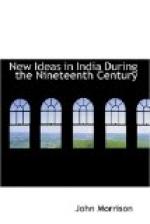CHAPTER IV
THE CHIEF SOLVENT OF THE OLD IDEAS
“Let knowledge grow from more to
more,
But more of reverence in us dwell;
That mind and soul according well,
May make one music as before.”
TENNYSON, In Memoriam.
[Sidenote: English education the chief solvent.]
English education is the chief solvent of old ideas in India and the chief source from which the new are supplied. English is the language of the freest peoples in the world. It is only to be expected, therefore, that with the spread of English education in India the idea of individual freedom and the feeling of nationality should grow and the caste idea decline. The beginning of the process is often witnessed among the boys in Secondary Schools in India. You lay your hand upon the arm of a boy, a new-comer to the school, and you ask him in English, “What class?” He answers “Brahman,” giving you his caste instead of his class in school. The boy will not be long in the English school before he will classify himself differently. In a dozen ways each day he is made to feel that the school and the modern world have another standard for boys and men than the caste. Or take another example of the educative effect of a study of English—I can vouch for its genuineness. In your house in India you get into friendly conversation with a half-educated shopkeeper or native tradesman. You ask in English how many children he has, and his reply is, “I have not any children, I have three daughters.” Just a little more reading in English literature would have taught him that elsewhere the daughter is a child of the family equally with the son.
There, in these two examples, the great social problems of India present themselves—caste and the social inferiority of women, and in the English language we see India confronted with ideas different from her own. Take a third illustration from the socio-religious sphere. Few Hindus think of Hinduism as a system of religious practices and doctrines to be justified by reason or by spiritual intuition, or by the spiritual satisfaction it can afford to mankind. No, Hinduism is a thing for Indians, and belongs to the Indian soil. The converse of the idea is that Christianity is a foreign thing, the religion of the intruding




